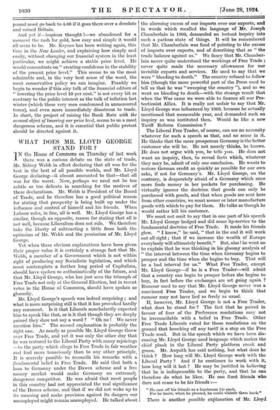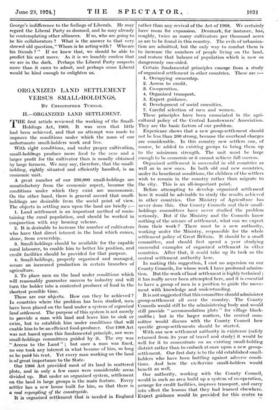WHAT DOES MR. LLOYD GEORGE STAND FOR ?
I-N the House of Commons on Thursday of last week there was a curious debate on the state of trade, Mr. Sidney Webb in effect declaring that all was for the best in the best of all possible worlds, and Mr. Lloyd George declaring—it almost amounted to that—that all was for the worst. Now, perhaps we need not be too subtle or too delicate in searching for the motives of these declarations. Mr. Webb is President of the Board of Trade, and he therefore has a good political reason for stating that prosperity is being built up under the influence and control of himself and his friends. When Labour rules, in fine, all is well. Mr. Lloyd George has a similar, though an opposite, reason for stating that all is not well, because Liberalism does not rule. We therefore take the liberty of subtracting a little from both the optimism of Mr. Webb and the pessimism of Mr. Lloyd George.
Yet when these obvious explanations have been given their proper value it is certainly a strange fact that Mr. Webb, a member of a Government which is not within sight of producing any Socialistic legislation, and which must contemplate a further long period of Capitalism, should have spoken so enthusiastically of the future, and that Mr. Lloyd George, who has just seen the triumph of Free Trade not only at the General Election, but in recent votes in the House of Commons, should have spoken so gloomily.
Mr. Lloyd George's speech was indeed surprising ; and what is more surprising still is that it has provoked hardly any comment. Is it that Liberals nonchalantly expected him to speak like that, or is it that though they are deeply pained they dare not say a word ? " Oh no ! We never mention him." The second explanation is probably the right one. As nearly as possible Mr. Lloyd George threw over Free Trade, and yet it was only the other day that he was restored to the Liberal Party with many rejoicings —to the party which clings to Free Trade in fair weather and foul more tenaciously than to any other principle. It is scarcely possible to reconcile his remarks with a fundamental belief in Free Trade. He said that both a loan to Germany under the Dawes scheme and a free money market would make Germany an extremely dangerous competitor. He was afraid that most people in this country had not appreciated the real significance of the Daives scheme, and that if we did not wake up to its meaning and make provision against its dangers our unemployed might remain unemployed. He talked about the alarming excess of our imports over our exports,- and in words which recalled the language of lir. Joseph Chamberlain in 1903, demanded an instant inquiry into such a parlous state of things. It will be remembered that Mr. Chamberlain was fond of pointing to the excess of imports over exports, and of describing that as " the trade balance against us." We fancy that Mr. Chamber- lain never quite understood the workings of Free Trade ; never quite made the necessary allowances for our invisible exports and services. He used to say that we were " bleeding to death." The country refused to follow him (though the more powerful part of the Press used to tell us that he was "sweeping the country "), and so we went on bleeding to death—with the strange result that when the War came we were able to finance all our Pro- tectionist Allies. It is really not unfair to say that Mr. Lloyd George was influenced by 1903, because he actually mentioned that memorable year, and demanded such an inquiry as was instituted then. Would he like a new Tariff Reform Commission ?
The Liberal Free Trader, of course, can see no necessity whatever for such a speech as that, and no sense in it. He thinks that the more prosperous Germany is the better customer she will be. He not merely thinks, he knows. He does not argue with you, he tells you. He does not want an inquiry, then, to reveal facts which, whatever they may be, admit of only one conclusion. He wants to restore German credit as quickly as possible for our own sake, if not for Germany's. Mr. Lloyd George, on the contrary, is desperately afraid of a Germany which once more finds money in her pockets for purchasing. He virtually ignores the doctrine that goods can only be purchased with goods, and that when goods are sent here from other countries, we must sooner or later manufacture goods with which to pay for them. He talks as though he would rather kill his customer.
We must not omit to say that in one part of his speech Mr. Lloyd George hedged and did some lip-service to the fundamental doctrine of Free Trade. It made his friends glow. " I know," he said, " that in the end it will work out all right ; that if we increase the wealth of Europe everybody will ultimately benefit." But, alas ! he went on to explain that he was thinking in his gloomy analysis of " the interval between the time when Germany begins to prosper and the time when she begins to buy. That will be a bad interval for us." What Free Trader, except Mr. Lloyd George—if he is a Free Trader—will admit that a country can begin to prosper before she begins to buy, in fact before the exchanges are set going again ? Rumour used to say that Mr. Lloyd George never was a convinced Free Trader, and we begin to think that rumour may not have lied so freely as usual.
If, however, Mr. Lloyd George is not a Free Trader, what does he stand for ? The fact that he paired in favour of four of the Preference resolutions may not be irreconcilable with a belief in Free Trade. Other Free Trade Liberals voted for those resolutions on the ground that knocking off any tariff is a step on the Free Trade road. But in the speech which we have been. dis- cussing Mr. Lloyd George used language which makes the chief plank in the Liberal Party platform creak and groan. Mr. Asquith has said nothing, but what does he think ? How long will Mr. Lloyd George work with the Liberal Party ? And if he continues to work with it, how long will it last ? He may be justified in believing that he is indispensable to the party, and that he can therefore do what he likes. He can flout friends who dare not cease to be his friends :- " He cast off his friends as a huntsman his pack,
For he knew, when he pleased, he could whistle them back."
There is another possible explanation of -Mr. Lloyd George's indifference to the feelings of Liberals. He may regard the Liberal Party as doomed, and he may already be contemplating other alliances. If so, who are going to be his collaborators ? What is the answer to that very shrewd old question, " Whom is he acting with? Who are his friends ? " If we knew that, we should be able to -predict- his next move. As it is .we humbly confess that we are in the dark. Perhaps the Liberal Party suspects more than it cares to admit, and perhaps some Liberal would be kind enough to enlighten us.















































 Previous page
Previous page